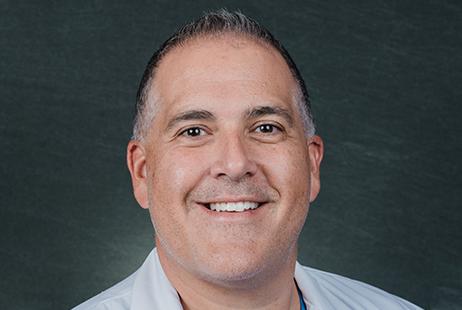For James Gerace, PA-C, providing the best care and emotional support to the parents and family members of babies boils down to doing what’s right as a professional. As a physician assistant in the NICU, James enjoys the variety it provides. His favorite part is seeing the progress of his patients and discharging them home.
Why did you decide to become an APP?
My undergraduate degree was in Clinical Laboratory Science and I was working as a generalist in a hospital laboratory analyzing patient samples in blood bank, hematology, chemistry and microbiology. A clinical laboratory scientist works as an extension of the medical team, providing vital information required to treat patients. However, personal patient interactions were limited, . At the same time, I was volunteering and working as an Emergency Medical Technician which provided me with direct patient care experience. After a couple years working in the laboratory, I wanted to work more closely with patients and wanted to grow professionally, so I pursued a degree as a physician assistant.

Can you walk us through a typical day?
There really is no “typical” day in the NICU. APPs cover the unit 24 hours a day. There are different roles in the NICU depending on the shift you work. I could be carrying a service of 6-9 babies during the day and then cross covering additional patients during the night. When carrying a team, the day starts at 7 am. Rounds begin around 9 am and can go until noon. Orders are written and notes are completed. We are backup delivery room providers for term deliveries, and we attend all preterm deliveries or known patients requiring NICU admission and care. We perform procedures throughout the day depending on the needs of our babies, including intubation, central line placement, chest tubes and lumbar punctures.
If I am not covering a service, I am team lead for neonatal critical care transport. We can care for premature infants, surgical patients, cardiac patients and those infants who require therapeutic hypothermia. These infant are born in community hospitals and they require stabilization prior to transport to Connecticut Children’s. The team is an APP or fellow, nurse and respiratory therapist.
How do you build a connection with your patients?
Many of the connections I make are with the parents of our babies. I try to take care of the same babies on service, so there is a continuity of care for the baby and their parents. It makes a difference, especially when you have cared for a baby since birth. Believe it or not, the babies all have their own personalities and you develop a bond with them.
What do find the most rewarding about your work?
The most rewarding moment is when a very sick infant, who you’ve been sitting at the bedside managing, turns the corner and stabilizes. Also, helping parents through the difficult journey of a NICU admission and then being able to discharge a healthy baby home is an incredible joy for me and the parents.
What is your most memorable moment at Connecticut Children’s?
The most memorable moment at Connecticut Children’s is when a baby I cared for, who had a very difficult and life-threatening course, returned years later with their parents healthy, active, intelligent and thriving. This makes all the difficult days at work worth every moment.
What role do APPs play here at Connecticut Children’s?
Advanced Practice Providers play an integral part in the care that we provide patients in the NICU. We are available for deliveries, consults in the well-baby nursery, emergencies in the Hartford Hospital and Connecticut Children’s emergency department, and we are the team lead for neonatal critical care transport. APPs also provide educational, procedural and emotional support to our fellows and residents. Many of the APPs are also clinical preceptors for neonatal nurse practitioner and physician assistant programs.
What specific challenges have you encountered in this field, and how have you managed these challenges?
When I graduated from my physician assistant program over 20 years ago, the role wasn’t very common, even though the first PA programs were established in the early ‘70s. Institutions and medical practices did not know how to incorporate physician assistants into their practice. Positions required five years or more experience, which was hard to achieve being a new graduate. Now nearly every specialty and practice has a PA. I am lucky to work in an institution that readily accepts the role, knowledge, and importance of having APPs as integral members of the medical team and encourages growth and advancement.
What advice would you give current and prospective students who are interested in becoming APPs?
Students interested in becoming a physician assistant need to know that the profession requires lifelong learning. Students should be actively engaged in pursuing shadowing opportunities in different specialties, obtaining clinical experience and direct patient contact, and understand different patient populations and needs in order to provide the best possible.
How do you feel Connecticut Children’s has supported your career growth?
Connecticut Children’s provided me with the opportunity to continue my education while working full time, which allowed me to obtain a doctoral degree in health sciences through the educational assistance program offered as part of our benefits. Obtaining this degree has allowed me to continue learning and advance in my personal goals to become an educator. I am an instructor of pediatrics for the University of Connecticut School of Medicine, an adjunct professor at University of Bridgeport, and an adjunct clinical professor at Quinnipiac.
How do patients and families inspire you?
Babies inspire me every day! These little miracles are resilient, and the support from their parents and the care we provide, allows for incredible outcomes. The NICU journey has highs and lows but when a baby goes home with their parents, it inspires to come back and provide the best care possible.
